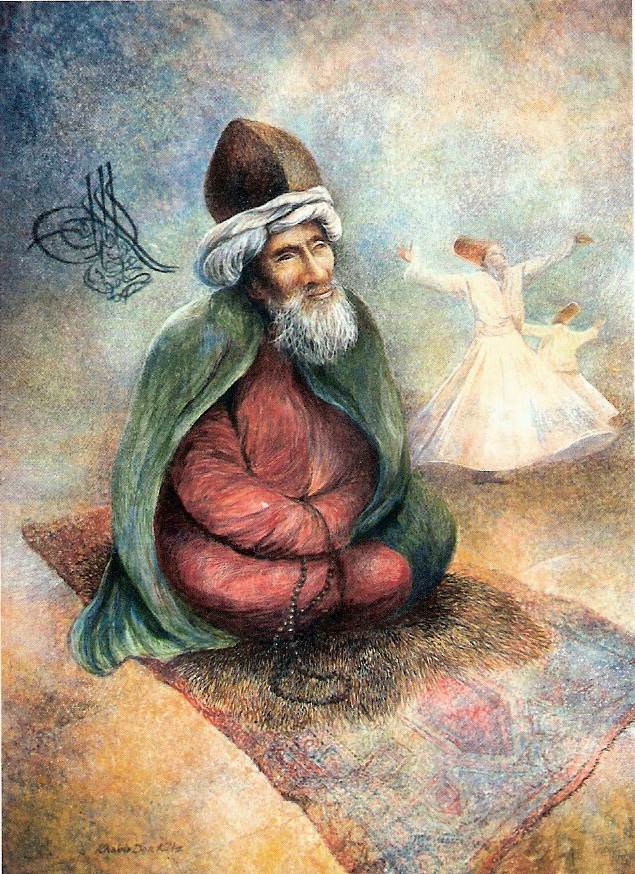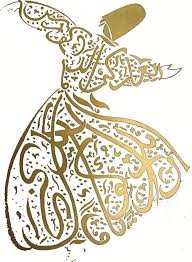
Greetings friends.
I was grateful to gather for our first class after illness delayed our beginnings for a few weeks. Four of the seven registered participants were able to join us. Two more folks have recently registered, totaling eight Inquirers. We gather again at 6:30 on Wednesday November 29 at 1827 12th Ave SE, Oly 98501.
Our third session is December 13. We’ll focus our inquiry on Mevlana Jalal al-Din Muhammad Rumi, in honor of his Urs (Death Anniversary).

I, you, he, she, we.
In the garden of mystic lovers,
these are not true distinctions.
– Rumi
We opened our first gathering with the Sufi Invocation by Hazarat Inayat Khan. The version below incorporates additional words from a recent offering by Murshid Mariam Baker, a senior guide in the Sufi Ruhaniat. Her invitation expands our inclusion and consideration through three repetitions: Inayat Khan’s original; adding ‘Messenger’ the second time to acknowledge all known and unknown, named and unnamed teachers; and finally, including ‘Mystery, Miracle, and Mother’ to reverence for the inexplicable glory that is this life, recognition of the unfathomable depths of its mystery, and deep gratitude and honor for the womb of creation and womankind.
“If there is to be a future, it will wear the crown of feminine design.” Aurobindo
Toward the One.
The Perfection of love, harmony, and beauty.
The only being.
United with all the illuminated souls,
Who form the embodiment of . . .
The master. The Spirit of Guidance.
The Master, The Messenger. The Spirit of Guidance.
The Master, The Messenger, The Mystery, The Miracle, The Mother.
The Spirit of Guidance.
Inner Ablutions (Wudhu)
Ablutions, or ritual washing, is a practice of purification and intention-setting in preparation for prayer. The Arabic term (Wudhu) literally means ‘turning on the light’. An excellent idea before entering the room! We’ll explore a form of Inner Ablution that focuses on purification with our breath, heart, intention, and remembrance of the Real (Al Haqq).
The practice includes three steps:
- Be present to the self-clarifying breath by observing air movement through nostrils and across upper lip. Just noticing.
- Cleanse the mirror of the heart by focusing attention on the sternum (Latifa Sirria- subtle heart) and breathing with a sense of grace and love into that spiritual center. Momentarily observe the felt sense or shift (if any).
- Chant 3-6 slow and spacious repetitions of ‘La ana illa anta’ (No I. Only Thou.) Take the space of a breath or two between each rep to taste (Dhawk) the flavor of experience. Take the space of several breaths at the end to drink in (Sharab) the practice, allowing what is present in the heart to penetrate and deeply inform your being.
‘
‘No I, only Thou’ is offered as a preparatory practice for opening the aperture of this experience to the unlimited reality of Being. ‘Thou’ (Allah) is not ‘a being’, not an entity (IMHO). It is Being, or the ‘field’ within which being manifests, the mystery giving it birth. The bodies currently inhabited by the being we experience the world with are microscopic flashes of space/time light. Being is not bound by time and space. So, the Ablution sets an intention, with compassionate recognition (and grace!) for the divine fallibility inherent in the embodied, individuated, (in-ego) stumble-dance of being, in a human form.
Remembrance
Chanting (Zikr) and silent repetition (Fikr) of La illaha ilalla hu: There is no existence, except Allah. Nothing is worthy of worship, save Allah.
“As for the Divine Reality in Itself- often called the “Essence” (dhāt)- It is plain, nameless, and unknowable in the simplicity of Its being (wujūd). ” Chittick
The very word Zikr really means “remembrance,” and although it is used with respect to God (Allah) it is actually keeping the mind free. The remembrance of God affects the remembrance of everything. As Jesus has said, “Seek ye first the kingdom of the Heavens and then all else shall be added.” But people have seen in the kingdom of the Heavens, the fulfilment of desires, selfish and unselfish, whereas the wise see kingdom over desires. And when we approach life from that angle, we begin to achieve the mastery. We will no longer be a slave of desire. By the practice of [chanting] Zikr we are really expressing reliance on God, and this brings all faculties into life, not only the memory. And when we repeat the same phrase, La Illaha El Il Allah in thought (Fikr) we vivify and revivify the whole mind so that all its faculties move towards excellence. Hazrat Inayat Khan
If you are so moved, invest a little time chanting these words in the morning and/or evening- a few minutes chanting out loud, followed by a few minutes of silent repetition, and a few minutes with the feeling of the words, while letting the repetitions fade into the cosmos.
The Most Beautiful Names
(al-Asma’ ul-Husna)

Allah is the essential essence of Being (Wujud) beyond description, a pure and absolute quality giving rise to all qualities and quantity. Allah’s creation and expression can be conceptualized through relative qualities called ‘divine attributes’ or ‘divine names’, which can be keys to the relationships among all that exists.
“Prayerful recitation of the 99 Names of Allah has been a sacred practice by Sufis, and by the various Sufi Orders, since the time of the Prophet Muhammad. Through active remembrance of these divine qualities, travelers on the spiritual path can overcome narcissism, resolve their issues of separation from God and from humanity, and awaken to God’s presence manifesting in all their relationships, inner and outer, earthly and heavenly.” Wali Ali Meyer, author of Physicians of the Heart, with Bilal Hyde, Faizal Muqaddam, and Pir Shabda Kahn.
Neil Douglas-Klotz, author of the Sufi Book of Life, frames the names also as ‘pathways’ that can guide us toward becoming fully human through a revival of our inner ecology and diversity of spirit. We can recognize these attributes as parts of our own soul, at home in a heart that occupies an ever-expanding universe of inner and outer relationships.

We must assiduously rub the rust from the heart.
So that the light of the Divine Sun may most wholly be reflected with it.
The Divine Names and Zikr are the soap and water we use to do this.
Rumi
We’ll partake of these practices in each of our sessions, along with readings, stories, and contemplation on quotes from a variety of Sufi adepts.
In our next session, we’ll discuss the first four brief sections from Inayat Khan’s Gathekas for Candidates. Read through them before Wednesday if you are able.
Abundant blessings. See you soon. Mubdi

One Response
Thank youuuu! : ) Looking forward to seeing you all again soon. I really enjoyed our 1st meeting, really hit the spot for me. Thank you all. Thank you Ted! ~ Su